entire issue [pdf 9.9 mb] - Pitt Med - University of Pittsburgh
entire issue [pdf 9.9 mb] - Pitt Med - University of Pittsburgh
entire issue [pdf 9.9 mb] - Pitt Med - University of Pittsburgh
Create successful ePaper yourself
Turn your PDF publications into a flip-book with our unique Google optimized e-Paper software.
GeRRY Douglas<br />
Ahead <strong>of</strong> the Pack<br />
By sHaron Tregaskis<br />
Guests no longer comment on the<br />
mounds <strong>of</strong> boxes, crammed with medical<br />
equipment, in Gerry Douglas’ (PhD<br />
’09) front room. Soon after the <strong>Pitt</strong> assistant<br />
pr<strong>of</strong>essor <strong>of</strong> bioinformatics and his wife, Thuy<br />
Bui, an MD and associate pr<strong>of</strong>essor <strong>of</strong> medicine<br />
and medical director for <strong>Pitt</strong>’s Program for<br />
Health Care to Underserved Populations, first<br />
called their Highland Park residence home,<br />
friends and family dubbed the side <strong>of</strong> the great<br />
room across from the fireplace “the warehouse.”<br />
Between a rarely played upright piano<br />
and an <strong>of</strong>t-ignored treadmill, Douglas has<br />
asse<strong>mb</strong>led all <strong>of</strong> the trappings <strong>of</strong> a mail-order<br />
depot: a digital scale (accurate to one onehundredth<br />
<strong>of</strong> a pound), a collection <strong>of</strong> battered<br />
luggage from which he’s removed every<br />
extraneous accoutrement, and, always, more<br />
boxes. Throughout the winter, he repacked<br />
3,000 pounds <strong>of</strong> equipment destined for<br />
Baobab Health, a nongovernmental organization<br />
he founded with Bui in 2000 to provide<br />
data collection and management tools to the<br />
Malawian Ministry <strong>of</strong> Health.<br />
“He’s a packing machine, with skills<br />
ordinary humans don’t possess,” says Mary<br />
Herbert, clinic director for the Program for<br />
Health Care to Underserved Populations.<br />
“He’s flat-out gifted at packing a crate to go<br />
overseas. He will get it within an ounce <strong>of</strong> the<br />
maximum allowed.”<br />
Back when he was flying more and using<br />
cargo less, he says, he knew the <strong>Pitt</strong>sburgh airport<br />
check-in agents by name. They developed<br />
a routine. “They would weigh the first, and it<br />
would be 50.0 pounds; then the second, and it<br />
would be 50.0,” he says. The agent would ask<br />
if the others were the same, and take him at<br />
his word. “On occasions when the airport scale<br />
showed more than 50 pounds,” he says, “I’d<br />
smile and say, ‘Better get that scale checked.’”<br />
Douglas deploys the same meticulous<br />
attention to detail in all he does, whether<br />
designing a touchscreen-based electronic<br />
medical record for Baobab or managing the<br />
spreadsheet <strong>of</strong> guest arrivals and departures at<br />
the couple’s home in the landlocked republic<br />
COURTESY ARTURO LOPEZ PINEDA<br />
In 2011, Douglas (second from right) launched the inaugural Summer Internship in Global<br />
Health Informatics, taking a team <strong>of</strong> graduate students to Lilongwe, Malawi, where they worked<br />
with Baobab Health employees on maternal and child health projects at a local hospital.<br />
in southeastern Africa. “It’s not just for myself<br />
and my family when we’re there, but to facilitate<br />
experiential learning opportunities for<br />
<strong>Pitt</strong> medical students, residents, and faculty,”<br />
he says. “The house is always full.”<br />
In Malawi, intermittent power, low literacy<br />
rates, a shortage <strong>of</strong> health care providers, and<br />
high patient volume have traditionally hampered<br />
data collection to inform patient care<br />
and national policy. Working within those<br />
constraints, Douglas designed a touch-screen<br />
electronic medical record system that has<br />
enrolled 1.6 million patients at 25 sites, where<br />
it’s used to track lab and radiological results, as<br />
well as HIV treatment.<br />
More recently, as director <strong>of</strong> <strong>Pitt</strong>’s nascent<br />
Center for Health Informatics for the<br />
Underserved, Douglas has begun mining a<br />
decade’s experience <strong>of</strong> process improvement<br />
through his work with Baobab. He wants<br />
to enhance access to health care for poor<br />
Americans. “I want to create a high-level<br />
approach to thinking about the lessons we’ve<br />
learned in Malawi and how we can distill its<br />
essence into a set <strong>of</strong> principles,” he says. “What<br />
is the ‘implementation science’ <strong>of</strong> working in<br />
informatics in a low-resource setting?”<br />
After myriad dinner table conversations<br />
with Bui, Herbert, and their colleagues,<br />
Douglas proposed a pilot project at the<br />
Birmingham Free Clinic, on <strong>Pitt</strong>sburgh’s South<br />
Side. “Why can’t we apply the successes we’ve<br />
had in developing countries,” he muses, “if<br />
[clinics in rural and other underserved areas] in<br />
the U.S. are experiencing the same problems?”<br />
The vast majority <strong>of</strong> Birmingham Clinic<br />
patients are homeless and afflicted with a constellation<br />
<strong>of</strong> chronic diseases, including diabetes,<br />
hypertension, and asthma, says Herbert.<br />
“Most are on multiple medications. And our<br />
pharmacists hand-label and hand-dispense<br />
them,” says Herbert. “We move 5,000 prescriptions<br />
every year with 10 regular pharmacists.<br />
How can we make that process more<br />
efficient to improve safety and handle more<br />
patients?”<br />
Douglas proposed an elegant little labeling<br />
machine he’d successfully adapted for Baobab,<br />
complete with bar codes. “Sometimes we work<br />
with people who want to create and design<br />
things, and you get the sense that they don’t<br />
really care or understand what you do,” says<br />
Lauren Jonkman (PharmD ’06, MPH ’12),<br />
who works with students at the Birmingham<br />
Free Clinic. “With Gerry, it’s really clear that<br />
he wants it to be something we’ll use, that will<br />
actually solve problems.”<br />
Jonkman’s observation drives to the core <strong>of</strong><br />
bioinformatics, says Douglas. “It’s not about<br />
computers, technology—it’s about understanding<br />
people’s problems and building technology<br />
to support them. We’re trying to make<br />
people’s jobs easier by helping them do things<br />
faster, with fewer mistakes.”<br />
n<br />
SPRING 2013 39


![entire issue [pdf 9.9 mb] - Pitt Med - University of Pittsburgh](https://img.yumpu.com/38305599/41/500x640/entire-issue-pdf-99-mb-pitt-med-university-of-pittsburgh.jpg)
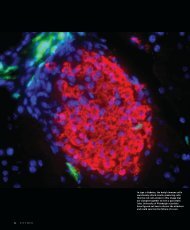
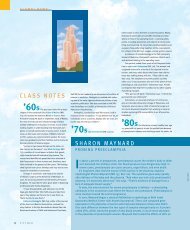
![entire issue [pdf 2.79 mb] - Pitt Med - University of Pittsburgh](https://img.yumpu.com/50435398/1/190x231/entire-issue-pdf-279-mb-pitt-med-university-of-pittsburgh.jpg?quality=85)
![entire issue [pdf 6.47 mb] - Pitt Med - University of Pittsburgh](https://img.yumpu.com/50360689/1/190x231/entire-issue-pdf-647-mb-pitt-med-university-of-pittsburgh.jpg?quality=85)
![entire issue [pdf 12.7 mb] - Pitt Med - University of Pittsburgh](https://img.yumpu.com/49831615/1/190x231/entire-issue-pdf-127-mb-pitt-med-university-of-pittsburgh.jpg?quality=85)
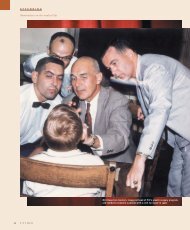
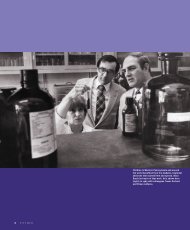
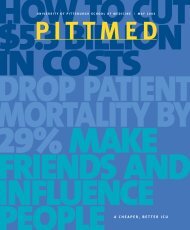
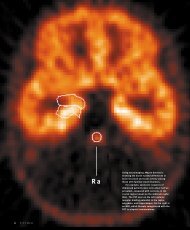
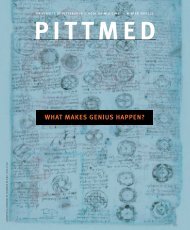


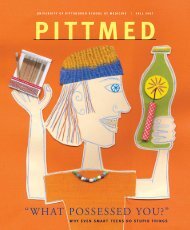
![entire issue [pdf 11.3 mb] - Pitt Med - University of Pittsburgh](https://img.yumpu.com/46685830/1/190x231/entire-issue-pdf-113-mb-pitt-med-university-of-pittsburgh.jpg?quality=85)
![entire issue [pdf 12.7 mb] - Pitt Med - University of Pittsburgh](https://img.yumpu.com/44997419/1/190x231/entire-issue-pdf-127-mb-pitt-med-university-of-pittsburgh.jpg?quality=85)